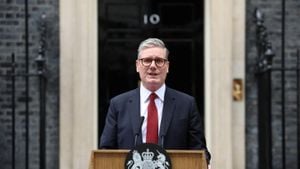Under the newly formed Trump administration, led by Elon Musk, significant changes are expected to occur as the U.S. government aims to cut spending by $2 trillion. This ambitious plan has raised eyebrows not only because of its scale but also due to Musk's unconventional role—co-heading the Department of Government Efficiency. His appointment signals the seriousness with which the administration intends to tackle federal expenditures.
During the fiscal year 2024, which runs from October 2023 to September 2024, the U.S. government spent approximately $6.75 trillion. If Musk's proposed cuts are implemented, it will represent about 32% of this total spending. Experts are already expressing concerns about how such major cuts could impact the economy.
Christopher Wood, global head of equity strategy at Jefferies, has articulated skepticism over the cuts. He pointed out during an interview, "The Treasury bond market will sell off, and we could see a deflationary shock to the economy... If Trump champions such policy, it would mean cutting entitlements." Wood's remarks reflect fears of investor instability as stakeholders await how these cuts could ripple through financial markets.
Some analysts worry this transition may tighten financial conditions, leading to increased bond yields, which would pose challenges for the already fragile stock market. If the bond yields continue to rise as deemed by market indicators, it could shift investor behavior, leaning them toward more stable securities.
On the other end of the spectrum, Connecticut Governor Ned Lamont has opted for spending cuts as well but with contrasting reasoning. Despite projections of ending the fiscal year $1.6 billion to the good, Lamont's administration is tightening its budget belt. This initiative includes mid-year funding reductions for public colleges and universities. Lamont emphasized the necessity of this move due to projections indicating government spending could overrun approved limits by nearly $400 million.
Jeffrey Beckham, Lamont’s budget director, has been vocal about the urgency of addressing these overruns driven largely by spiraling Medicaid costs, which account for over half of the estimated shortfall. According to him, these increases are exacerbated by not adjusting the state budget to accommodate the surging expenses. This situation mirrors broader national trends which indicate health care-related costs are burdensome across the board.
Interestingly, some Democratic legislators within the state have criticized Lamont’s approach, arguing it doesn't align with the projected surplus. They insist this surplus should not prompt cuts but rather enable additional investments and improvements. Discontent is growing among lawmakers and union leaders who contend such fiscal discipline makes little sense against the backdrop of positive financial forecasts.
While Connecticut's leadership seeks to reconcile their budget constraints, federal decisions appear to stray from disciplined spending frameworks. With Musk steering federal budget cuts, the debate continues: how sustainable is the proposed $2 trillion reduction in government expenses? The outcome remains uncertain as financial analysts and government officials navigate potentially turbulent economic waters.
Overall, as both federal and state-level authorities approach spending adjustments, the broader question looms: can the government maintain its commitments to public services as leaders attempt to rein in perceived overspending? The mixed outcomes of these policies may shape the financial landscapes of their respective realms for years to come, facilitating active discussions around fiscal responsibilities and public service commitments.
With the Trump administration's cuts on one side and Lamont's budget tightening on the other, it's clear we are witnessing two very different approaches to fiscal management during periods of both surplus and economic uncertainty. Observers are left to ponder, what will be the long-term impact of such drastic changes on American society?



